
Welcome to the age of "Big Brother!" Privacy is almost gone, but you can reclaim some of it. And, you should.
Until about six years ago, it never occurred to me to hide my real name or location from anyone (well, except for the creeps at the gas station who sometimes ask for my phone number while I'm filling my tank in the middle of the night). Then, my husband got a stalker who started staking me.
You can read all about that lovely little incident here.
That really opened my eyes to the need for more privacy. A few other minor incidents caused by working online and having clients all over the world who I don't know personally brought the message home.
Being invisible to the world at large is an excellent idea. It can vastly improve the safety of you and your loved ones.
In fact, everyone should do it. Let's face it. There are some crazy people in the world, and if you're interacting with other people at all, you will encounter one eventually.
Here's how to make yourself invisible to would-be evildoers, while still being able to be part of the world.
20 Years Makes a Big Difference in Your Ability to Preserve Your Privacy

I got married in 1996 (way too young, but that's another story). At that time, when I was still in grad school, I handled privacy the same as I did when I was an undergrad, and in high school. Basically, I didn't give it much thought.
If someone asked for my phone number and I didn't want them to have it, I gave them a fake one (easy if you think you'll never see the person again).
If I gave someone my number and later regretted it, I stopped picking up their calls. That's what caller ID and an answering machine were for. Eventually, they'd get the hint. This worked on telemarketers, too.
If someone showed up at my door who I didn't know, I didn't answer it. A knock at the door does not demand an answer. Actually, I still do this.
One time, as an undergrad in college, a friend introduced me to a guy who I might have gone out with if he hadn't been so pushy. I mean, he was my type...cute, long hair, an artist, an environmental advocate. But, being so demanding about getting a date is a huge red flag that someone is emotionally unstable, you know?
My friend told him where to find my dorm, and he would come knock on the door looking for me quite often. I saw him coming through the window once and hit the floor so he wouldn't know I was there. He came up behind me once when I was coming back to the dorm with groceries after midnight and freaked me out. But, after ignoring him for a few weeks, he eventually stopped bothering me.
It doesn't always have to be persistent would-be suitors, either. In today's online world, there are so many different ways anyone can find you, contact you, harass you, and threaten you.
If there's someone you don't want to find you, be they friend or foe, or if you just don't want your information out there for advertisers and the government to use to gather intelligence on you, it's best to go invisible.
You don't even have to have something to hide. In this day and age, a nice layer of privacy between you and the outside world is just good sense.
Step One: Get Your Information Off of Those Online Directories
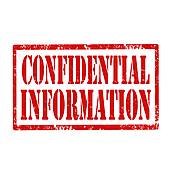
You've seen these sites. They provide addresses, telephone numbers, and sometimes email addresses for everyone. Some of them give you the information for free, but most of them will only give a preview up front, and make you pay a small fee for the rest. You do NOT want your information on these sites. It makes it too easy for anyone to find you, including stalkers, private investigators, marketers, the government, and basically anyone who you want to avoid.
So, how do you remove your information? It varies from site to site. Some of them allow you to delete your details yourself, right on the website. Others, you have to email, write, or even call to request removal. It's worth it to take the time to do it, though. You'll be much more secure.
If you come across a site that won't remove anything (and there are a couple), your best bet is to change your information, so what they have is incorrect. And, when you change your information, it will be into a format no one can use to find you.
Step Two: Set Up an LLC

An LLC is your friend when it comes to re-establishing your privacy. Only, you can't do it just anywhere. Most states require you to provide your physical location and contact information when setting up an LLC. This means, anyone can look up your LLC and see who you are and where you are.
Not good.
New Mexico is your ally in LLC privacy. Anyone can set one up there, and you can do it anonymously. All you need is a registered agent in the state, and there are companies in New Mexico who are willing to be your registered agent for a fee. Your name and contact information will never be attached to it. All you have to do is make the emailing address for your LLC your ghost address, which we'll talk about next.
You can use your New Mexico LLC for a lot of useful things, including:
Domain Name Registration
You have to have legit contact information when you register a domain name for a website, or it can be taken from you (if you're discovered to be providing false information). Using your New Mexico LLC contact info will prevent anyone from tracing a domain name you own back to you.
Make it extra secure by purchasing private registration with your domain name registrar. This gives you an extra layer of privacy against the prying eyes of the public, and allows you to conduct your online business in blissful anonymity.
Car Registration
Yes, you can register your car to your LLC. It becomes part of the assets of the company, and your name is not attached to ownership of your car. It's hidden behind your LLC's contact info, which should be nowhere near where you actually live.
House Deed
You can also put the deed to any house you buy in the name of an LLC. You can also set up a trust with an unusual name and put the deed in the trust. It's easier and cheaper to use an anonymous New Mexico LLC, though. In many states, property records are public records that you can look up online. When someone types your last name into an online property database, they won't find it, and so won't know where you live.
They would have to use your LLC name or trust name to find your house, and if they don't know it, they won't find it. This keeps you safe and secure from the crazy people who may be trying to find you, because they won't show up at your door.
Utilities
You can register your utilities to your LLC, with an address at your ghost address. Make sure you do it.
Banks
The same thing applies to banks. Instead of getting personal checks, get checks with the name and address of your LLC on them. You'll have to open a business checking account, but that's okay. You can use it just like you would a regular checking account. This way, the bank won't have your real contact info, and neither will anyone to whom you write a check.
Step Three: Get a Ghost Address

This is an extremely important part of being invisible. You're going to need two different addresses, neither of which can be your home address. One of the has to be a "ghost address."
The ghost address is what you want to use for registering anything official, or government-related. You won't be getting much mail there, but it's important to keep those official registrations separate from anything else you do. It makes it harder to find you this way.
Some people set up ghost addresses by installing mailboxes on rural roads and giving them an appropriate number. Other people use abandoned houses. It's really best, though, to keep your ghost address out of your home state entirely.
There are companies that will sell you a ghost address. These companies usually accept a set number of pieces of mail they will take for you each year, and they will forward them to the second address you will establish (the place you actually receive your mail, which is still not at your house). I used a company in Alaska for years for my ghost address, though I've moved it offshore now, for even more privacy. Yes, you can get ghost addresses in foreign countries, which is actually the best option.
Some of the things you can use with your ghost address include:
Your Driver's License
Some people looking for privacy just move and never change the address on their driver's license. While just about every state has a law stating you have to change your driver's license address to your current address within a certain amount of time after moving, keeping it as your old address shouldn't be a problem if you never get pulled over.
You can also put your ghost address on your driver's license, if your ghost address is in the same state where you live. My husband did this, and even got pulled over once with it that way, and it was never an issue. The police officer didn't question it, and he just got a warning for not slowing down enough before turning a corner (he disputes to this day that he didn't slow down).
If your ghost address is in another state, see about getting a license in that state. If you have an established address there, you can often do it.
Car Registration
Now, imagine this. Your car is registered to an LLC in New Mexico, with a mailing address of your ghost address in another state. Maybe your driver's license has another address entirely, such as a second address in your own state, or your old address. This is going to confuse anyone trying to find you through your car. It will also confuse the police. But, it's perfectly legal to register your car this way.
House Deed
Put the deed to your house in an LLC with an address in a different state, and the secrecy of your home address is practically secured. I saw a savvy retired celebrity do this once (I'm a genealogist and I'm snoopy, okay). His house on the east coast was blurred out on Google Maps, and in the public property records, it was registered to an LLC with a mailing (ghost) address in Los Angeles, California.
I already knew where he lived, as it was widely reported among residents of that town online, so it was easy for me to see what he was doing, and I used it as a model for myself. See, that was his one mistake....letting people around town he didn't know too well know where his house was located. Don't give this information out to anyone but those closest to you, and no one will be able to figure out where you live.
Step Four: Use a P.O. Box
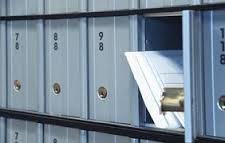
This is your second address, and it will be the place you use to get most of your mail. Again, only official documents go to the ghost address. The important thing to remember here is to NEVER get mail at your actual house. Do it once, and your name can be associated with your home address in who knows how many databases. You do NOT want your name and physical address associated ANYWHERE.
You can sign up for a P.O. box using your ghost address if you have it on your driver's license. The post office is going to want to see two pieces of mail that match the address on your license before they give you a box. If you've just moved, you can use the address of your previous residence, if it is on your license, and mail you got there.
If you can't make the ID and the mail addresses match, get a box at the UPS store, instead. It's a little more expensive, but the lines are shorter for picking up packages, and you get more personalized service, because the people at the store start to recognize you when you come in to get your mail. Their ID requirements are far less stringent than the post office, too.
Any and all mail and package deliveries other than the official documents that go to your ghost address MUST go to your secondary address, and that secondary address MUST NOT be your house.
Step Five: Use Burner Phones for All Official Business
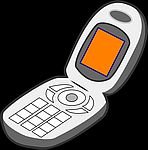
A lot of websites ask for your phone number. So do banks, doctor's offices, schools, and just about any other place you can imagine. If someone is not a close friend or family member, they do not need your "real" phone number, and you should never give it to them. Get one or more "burner" phones (those pre-paid phones that are disposable), and give out the numbers to those phones for all of your personal business. Just remember to keep a list of who has what number, if you have more than one burner phone.
Step Six: Never Get Deliveries at Your House
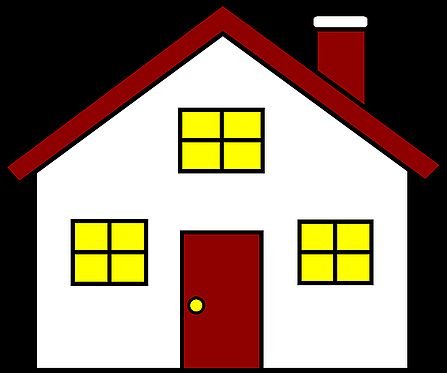
This doesn't just apply to packages. Don't even get pizza delivered to your house. Go pick it up, if you've got to have it. Once you have any kind of food delivered to your house, your name and physical address are associated in a database that can be hacked, sold to other companies, turned over to the government, and otherwise shared in ways you want to avoid.
Step Seven: Use Your Passport for ID

Your passport is a perfectly valid form of ID. You don't have to give your driver's license to anyone. Not everyone even has a license, anyway.
You may have to do some educating with this, as so many places are used to getting the driver's license as ID. Low level employees may not know a passport is a government-issued ID that can be subbed for it. I had to educate the check-in lady at the hospital when I went to have my second knee replacement, and presented her with my passport. She had to get a supervisor to assure her it was okay to use it instead of my license.
Your passport doesn't have your address, ghost or otherwise, on it, so it's excellent to use for ID.
Step Eight: Never Give Your Social Security Number to Anyone but the IRS
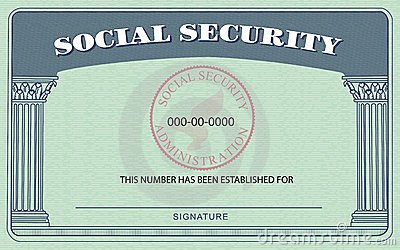
There is no law that says anyone needs your Social Security number except the IRS. You may not be able to get traditional credit cards without handing out that number, but you can get pre-paid and secured ones. Because Social Security numbers are so easily compromised, it's best to keep them private, mainly to protect yourself from identity theft, rather than conceal your location.
If you're somewhere like a doctor's office and they ask for it on your admissions forms, just leave it blank. They probably won't notice, and if they do, simply state you are choosing to not provide it, and remind them there is no law that says you have to.
Step Nine: If You Must Be Online, Take Precautions, Especially with Social Media

Most of us need to be online for one reason or another. If you're like me, you make your living there. You may also use it for keeping up with family and friends. The Internet is an important part of our daily lives in this modern era. Use it, enjoy it, but do so carefully and responsibly.
Establish Aliases
If you're on websites where you interact with people you don't know personally, always establish aliases. No one needs to know you real name, and keeping it secret doesn't make you untrustworthy; it makes you smart.
I write for both business clients, and as a novelist. I have an alias for both. I use my real first name, which is okay and safe to do. I just use different last names, depending on what I'm writing. My business clients know me by one last name, and those who read my novels know me by another surname.
You'd be wise to do the same. Once someone has your real first and last name, it makes it much easier to find you anywhere online or in the real world and harass you, even if your real first and last name are common ones.
I even use a variation in the spelling of my real last name on FB, and ONLY people who know me personally in the real world are allowed to friend me there. I don't want people I don't know (or don't want to talk to) finding my page by searching my real surname. I have other friends who do the same thing.
Security Settings
If you are on social media of any kind, and using it for personal use, look over the security settings of the site periodically and make them as tight as you can manage. This keeps unwanted prying eyes from seeing your posts and pictures.
Security settings aren't as much of a concern if you are using social media for business purposes, as I have to do to promote and market my novels. Just make sure you're using an alias, and, ideally, a profile photo of you wearing sunglasses or something else that makes you look a bit different than usual (so stalkers who would otherwise recognize you will have a harder time doing so).
Step Ten: Use a Pre-Paid Debit Card for Online Shopping
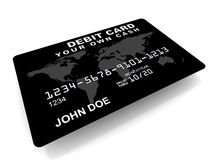
This keeps you from needing a regular credit card, where you will have to go through a lot of undesirable identity verification that may link your name to your real address or Social Security number, or compromise your identity to hackers.
Step Eleven: Make Sure Only Your Ghost Address and P.O. Box are on Your Credit Reports

I just did this recently, when I discovered it was an issue. Go over all of your credit reports from the three bureaus, and see if there are any incorrect or old addresses on there. See if your actual physical address is on there, too.
Then, call (don't write or email) each bureau and talk to their customer service representatives. Tell them those addresses are incorrect or out of date, even your current physical address. A little white lie in this area is worth it when it comes to your privacy. Ideally, you'll have done a good enough job of keeping your real address private and it won't be on your credit reports.
The customer service reps have the ability to take off any address you dispute, and they'll do it right then and there on the phone if you call them. The only reason why they might not take an address off is if it is attached to a currently open credit account or collection account. I've found TransUnion to be the easiest to deal with when removing addresses, though the technique works with all of them if you just call.
Step Twelve: Make Sure Your Friends and Family Know Your Real Address and Phone Number are Secret

This is super important, because so many well-meaning family and friends may give your contact information to anyone without a second thought. Collection agencies, private investigators, stalkers, and identity thieves may contact people who know you when they can't find you. Your loved ones may think they're being helpful by giving your information to strangers who are looking for you.
You must let them know your real phone number and address are top secret, and they are to never give it to anyone without your permission first, no matter what (even if the person says it's an emergency....tell them to not believe it, as this is a common scam to get people to provide information). The best thing they can do is take the information of the person looking for you and give it to you personally, so you can decide if you want to contact them or not.
Conclusion--An Invisible Person is a Happy, Safe, and Secure Person

I learned a lot of this from reading a fantastic book called "How to Be Invisible," by J.J. Luna. I recommend it to anyone. Other items in this list, I figured out on my own, through trial and error.
Having a stalker who is determined to cause trouble for you really prompts you to look into how to camouflage yourself from them in better ways.
There are a lot of steps to total real-life and online anonymity here, but they are all worth doing, each and every one. Once you've done them, you can continue to live your life as you've always done, and even still conduct business and more pleasurable pursuits online without being concerned about leaving a trail back to your real identity and location.
This isn't even getting in to using proxy servers and IP cloakers, which is a whole other subject, but also important for online privacy.
If you take these steps, you can live your life happily and confidently, knowing no one can find you unless you want them to.
That kind of peace of mind is priceless.

